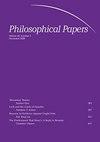Corporal Punishment: A Philosophical Assessment
IF 1.3
3区 哲学
0 PHILOSOPHY
引用次数: 0
Abstract
Patrick Lenta’s Corporal Punishment: A Philosophical Assessment provides a thorough, well-researched, accessible, and philosophically convincing examination of the normative status of the corporal punishment of children and a brief discussion of some implications of the main arguments on two related themes, namely the corporal punishment of animals and judicial corporal punishment of adults. Departing from the premise that all punishments need justification, Lenta first shows that, both on consequentialist and deontologist accounts, no convincing arguments have been provided in favor of the corporal punishment of children. On the contrary, investigating the available empirical evidence and relating it to the normative discussion, he concludes that the costs of corporal punishment of children clearly outweigh its benefits and that there are no convincing reasons to suggest that children are better off on balance because of corporal punishment (e.g., because it is necessary to form their moral character), let alone that they indeed deserve to be corporally punished (mainly because as children they do not possess full moral agency). Lenta then goes on to build his own account of why the corporal punishment of children is a moral wrong, based on different fundamental rights all human beings, including all children, possess: the right to security of the person and the rights to protection from degrading, cruel, or torturous punishment. While all corporal punishment violates the rights to security of the person and the rights to protection from degrading punishments, Lenta contents that the terms “cruel” and “torturous” should only be applied if a certain threshold of severity is overstepped. Subsequently, he assesses the question of how a state should regulate the (in his conclusion immoral) practice of corporal punishment. He is clear that the relevant rights of children have to be secured and that the corporal punishment of children has to be proscribed legally. Extending his arguments to the corporal punishment of animals and the judicial corporal punishment of adults and investigating analogies and disanalogies, Lenta comes to the conclusion that these practices ought to be eschewed as well. Philosophical Papers体罚:一种哲学评价
帕特里克·伦塔的《体罚:哲学评估》对体罚儿童的规范地位进行了全面、深入研究、通俗易懂和哲学上令人信服的考察,并简要讨论了两个相关主题的主要论点的一些含义,即对动物的体罚和对成年人的司法体罚。与所有惩罚都需要正当理由的前提不同,Lenta首先表明,无论是后果论者还是义务论者,都没有提供有利于体罚儿童的令人信服的论据。相反,在调查现有的经验证据并将其与规范性讨论联系起来后,他得出结论,体罚儿童的代价显然大于其好处,并且没有令人信服的理由表明,体罚使儿童在平衡中生活得更好(例如,因为有必要形成他们的道德品质),更不用说他们确实应该受到体罚(主要是因为作为孩子,他们没有完全的道德能动性)。Lenta接着阐述了为什么体罚儿童是一种道德错误,基于包括所有儿童在内的所有人所拥有的不同基本权利:人身安全权和免受有辱人格、残忍或折磨的保护权。虽然所有体罚都侵犯了人身安全权和免受有辱人格惩罚的保护权,但Lenta认为,只有在超过一定的严重程度时,才应使用“残忍”和“折磨人”这两个术语。随后,他评估了一个国家应该如何规范体罚(在他的结论中是不道德的)做法的问题。他明确指出,必须保障儿童的相关权利,必须从法律上禁止体罚儿童。Lenta将他的论点扩展到对动物的体罚和对成年人的司法体罚,并调查类比和否定,得出结论,这些做法也应该避免。哲学论文
本文章由计算机程序翻译,如有差异,请以英文原文为准。
求助全文
约1分钟内获得全文
求助全文
来源期刊

Philosophical Papers
PHILOSOPHY-
CiteScore
2.10
自引率
0.00%
发文量
18
期刊介绍:
Philosophical Papers is an international, generalist journal of philosophy edited in South Africa Original Articles: Articles appearing in regular issues are original, high-quality, and stand-alone, and are written for the general professional philosopher. Submissions are welcome in any area of philosophy and undergo a process of peer review based on initial editor screening and refereeing by (usually) two referees. Special Issues: Topic-based special issues are comprised of both invited and submitted papers selected by guest editors. Recent special issues have included ''Philosophy''s Therapeutic Potential'' (2014, editor Dylan Futter); ''Aging and the Elderly'' (2012, editors Tom Martin and Samantha Vice); ''The Problem of the Criterion'' (2011, editor Mark Nelson); ''Retributive Emotions'' (2010, editor Lucy Allais); ‘Rape and its Meaning/s’ (2009, editor Louise du Toit). Calls for papers for upcoming special issues can be found here. Ideas for future special issues are welcome.
 求助内容:
求助内容: 应助结果提醒方式:
应助结果提醒方式:


